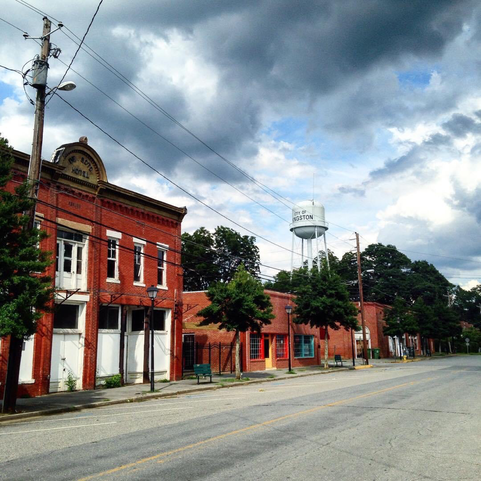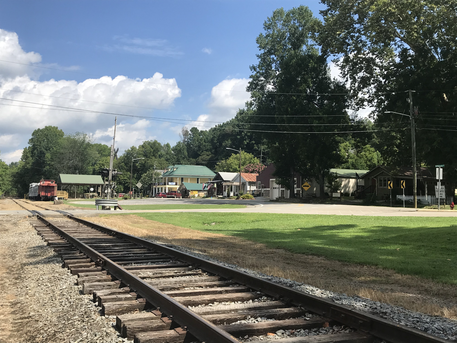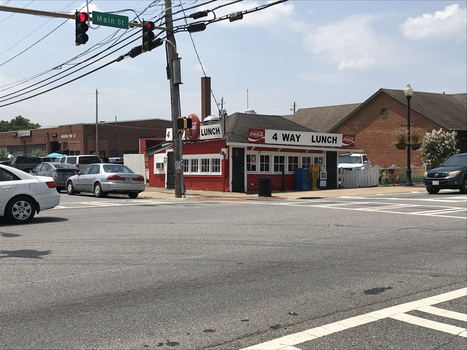 Kingston, Georgia, a case study of the haves and have-nots in the modern world Kingston, Georgia, a case study of the haves and have-nots in the modern world Sam Burnham, Curator At ABG we pride ourselves on our support of the small. Family owned. Home grown. Community oriented. Decentralized. So when I stumbled over a particular article this weekend I was left shaking my head. Natalie Escobar of NPR’s Code Switch was tossing softball questions to Vicky Osterweil who recently published a book trying to justify, even glorify the violent and chaotic riots that have destroyed large swaths of major US cities. I was disgusted by a particular quote even more than the constant droning of Marxism that filled the interview: “It's actually a Republican myth that has, over the last 20 years, really crawled into even leftist discourse: that the small business owner must be respected, that the small business owner creates jobs and is part of the community. But that's actually a right-wing myth.“ The first article linked in the quote is one of the faulty and incomplete arguments that Osterweil uses to justify violent mobs destroying the property and livelihoods of people unfortunate enough to find themselves in the path of advancing terror. The second linked article is a more scientific sounding argument from MIT citing figures and statistics downplaying the importance of small enterprise as a job creator in America. The gist of Osterwell's abhorrent claims is that looting and rioting is justified because the small businesses really don't matter to the economy. Osterweil claims the property being stolen by rioters is a just compensation because Osterweil believes that small businesses are all built on a foundation of racism. The idea that someone's livelihood, their slice of the American Dream is irrelevant and therefore welcome fodder for looting is a ridiculous instance of a bizarre elitism. But let's take a look at one of the claims from the MIT article: “Perhaps the biggest indictment of the small-is-beautiful view when it comes to jobs is the simple fact that in the United States small firms’ share of output and employment over time have been declining for decades.”  Talking Rock, an example of beautiful smallness Talking Rock, an example of beautiful smallness So if we see "small-is-beautiful" as some sort of conspiracy theory and that medium-sized and large businesses are the real job creators, what do we do with entire towns that are shuttered by the death of small businesses? While MIT argues that small business have declined over the last few decades, a 2018 article by the Pew Research Center shows that the average US worker has seen no measurable increase in wages in that same time period. You don't have to spend much time poking around on the web to find out that corporate outsourcing, restructuring, and downsizing have not been kind to US job markets. As I am writing this, Georgia economic mainstay Coca-Cola, which has the most recognizable trademark on Earth, has announced a massive reorganization that is going to cost thousands of people their jobs. If we look at the efforts of the federal government under Bush, Obama, and Trump, we see multiple bailouts of the auto industry, financial institutions, and any other business deemed "too big to fail." While it is statistically true that small enterprise is in decline, it is also true that these businesses always perform without a net. No one is going to bail them out. If they fail, they fail. While the cited articles talk about the Small Business Administration and the programs available to "help" entrepreneurs, reality remains Lee Iacocca sitting before Congress with his hat in his hand. the TARP program, and "Cash for Clunkers." However, the biggest fault in this argument is that it ignores that economic web of a healthy small community. We constantly discuss the economic principles of this web. It can be a powerful engine but we see how fragile it is when someone drops a Walmart or a Home Depot out on the bypass around town. Walmart, that started in Bentonville, Arkansas as a small five-and-dime is now one of the largest retailers in the world. It also pays its employees just enough that they can work 40 hours a week and keep a roof over their heads if they supplement their income with food stamps and Medicaid. Walmart isn't the only villain here. Most large corporations expend substantial resources to determine how few people they can utilize and how little they can pay them and still operate. They drop a retailer in a small town and the majority of the income generated leaves the store in an armored truck, never to be seen in the community again. Profits go to corporate headquarters far away and the small wages paid to workers usually wind up in that armored truck as employees purchase the goods they need from the only game in town. But the problem isn't just retailers. A local bank gets bought out by a large one. Suddenly a small business loan that was previously based on a relationship and a handshake now requires a phone call to Charlotte. The local newspaper, journalism's boots-on-the-ground, gets bought out by some conglomerate in New York or Chicago and restructured. The local radio station with local personalities who once broadcast local high school football gets bought out by Clear Channel and immediately automated and now only offers corporate music or syndicated political talk. People who once manufactured textiles, steel, automobiles, appliances, furniture, shoes, and machiery have seen their jobs sent overseas. So why do the people behind these articles see consolidation, centralization, and homogenization as beneficial? At the very least, how can they not see the decline of small business as highly problematic? While these businesses are in such a state, now can Osterweil justify, even celebrate the burning and looting of these businesses?  4 Way still doesn't even have a phone 4 Way still doesn't even have a phone Far from being irrelevant, small businesses can be the way forward for troubled communities. I found two claims in reading the two cited articles that I agreed with. The first is that one promise of small business is the possibility that it can become big business. I mentioned Walmart above as an example. But in juxtaposition we see the points that half of all small business owners didn't start their businesses principally to make money and that roughly 75% of small business owners have no intention of ever having more than a few employees. This is where a difference in philosophy comes into play. While big city, big government, and big college minds see dollar signs when they think of business, many small business owners are interested in being part of their community and finding personal fulfillment in their work. If these philosophies as well as the resources needed for startup find their way into troubled communities. Specifically, black-owned banks and businesses can become an economic and cultural engine that could improve local finances as well as protect people from exploitation at the hands of corporate giants. This scenario provides jobs, builds community pride, provides generational wealth, and fends off gentrification. Walmart and Wells Fargo can't, correction, won't do that. None of this is going to happen so long as people are encouraged to go to small businesses, kick in the door, steal everything that isn't bolted down, and then set the place on fire. On the other hand, if small business owners are respected, if their livelihoods are honored, and if their businesses are patronized, they have a real chance to create jobs, especially if more and more people start more and more small businesses. Such a trend could come from an honest and positive portrayal of small business. Essentially, the three articles I'm talking about have this one thread linking them all together: big government and big business built the modern world. The question is, is that really a good thing? Don't get me wrong, I appreciate electricity and indoor plumbing as much as the next guy, but there is a lot to the modern world that is less than desirable. For example, so long as our economy is measured in money alone, we can expect large corporations, medium sized businesses, and big government to scratch each other’s backs and leave small businesses and local governments out in the rain. Of course small businesses are struggling to keep up. Welcome to that modern world. Back in 1930 John Crow Ransom wrote “Industrialism is rightfully a menial, of almost miraculous cunning but no intelligence; it needs to be strongly guarded or it will destroy the (moral) economy of the household.” Some 90 years later industrialism has largely run its course and the economy of the household is all but dead. Ransom’s words were tragically prophetic. We need to restart our economies. I say that plural because I’m not just talking about money. Money is certainly part of the picture but without the economy of the household, the economy of place, the economy of people, a plan for healthy and sustainable growth, a holistic view of prosperity, and the determination to rein in “progress” we can expect to be stuck in the same rut we’ve been in for decades. We have to think small. We have to think local. We have to revive all these economies. You say small businesses aren’t an economic engine? I say that’s a symptom, not a cause.
0 Comments
Leave a Reply. |
Sam B.Historian, self-proclaimed gentleman, agrarian-at-heart, & curator extraordinaire Social MediaCategories
All
Archives
November 2022
|




 RSS Feed
RSS Feed
